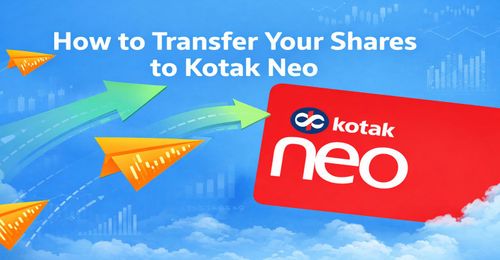BSDA Account: A Guide on Basic Service Demat Account
- 4 min read•
- 6,089•
- Published 22 Dec 2025

What is BSDA?
A Basic Services Demat Account (BSDA) is a type of dematerialised (demat) account introduced by the Securities and Exchange Board of India (SEBI) in 2012. The primary goal of the BSDA is to encourage small and retail investors to participate in the stock market by reducing the costs associated with maintaining a demat account.
Here are the key features of a BSDA:
1. Eligibility:
- An investor can have only one BSDA across all Depository Participants (DPs).
- The account's total value of securities must not exceed ₹10 lakh at any point to qualify as a BSDA.
2. Lower Maintenance Charges:
- A BSDA offers reduced annual maintenance charges (AMC) for small investors.
- No AMC for holdings up to ₹4 lakh.
- For holdings above ₹4 lakh but up to ₹10 lakh, the AMC is capped at ₹100 annually with 18% GST
3. Conversion to Regular Demat:
- If the value of holdings in the BSDA exceeds ₹10 lakh, it is automatically converted into a regular demat account, and standard charges apply.
4. Additional Services:
- BSDA holders can access basic services like electronic statements, account maintenance, and transactions, similar to a regular demat account.
5. Simplified Access:
-
Designed for small investors who may not frequently trade or hold large amounts of securities, making stock market participation more affordable.
-
This initiative aims to make investing in financial markets more inclusive by lowering the financial burden on retail investors.
Benefits of a BSDA
A BSDA offers zero minimum balance, ensuring easy access for all individuals without income or documentation restrictions. Account holders enjoy free essential banking services, including deposits, withdrawals (up to four per month across ATMs, NEFT/RTGS/IMPS, etc.), receipt of electronic credits, cheque collections, and passbook services – all without charges.
A free RuPay ATM‑cum‑debit card is also provided with no issuance or annual fee. For those opened under simplified KYC (‘small’ BSBDA), limits include maximum ₹50,000 balance, ₹1,00,000 annual credits, and ₹10,000 monthly debits, which is ideal for underserved segments. Importantly, customers cannot hold another savings account in the same bank, promoting focused services and preventing misuse.
How to Open a BSDA Account
Opening a Basic Services Demat Account (BSDA) is simple. You can open the account using online or offline process with Kotak Securities. If you meet the eligibility criteria, your account will be automatically opened as a BSDA. When you open a BSDA account, here’s what to expect:
-
You will receive quarterly statements of your transactions. However, no statements will be issued if there are no transactions during the period.
-
If the market value of your holdings is up to ₹4,00,000, no annual maintenance charges (AMC) will be applied by the depository participant.
-
For holdings between ₹4,00,001 and ₹10 lakhs, a nominal annual maintenance charge (AMC) is levied, capped at ₹100 per year (plus 18% GST).
Are There Any Charges on a BSDA?
While the BSDA is designed to be cost effective, there are a few charges to consider. If your total investments (including shares, mutual funds, bonds, etc.) are below ₹4 lakhs, you won’t be charged any annual maintenance fee (AMC). If your holdings are between ₹4–10 lakhs, the AMC is capped at ₹100 per year. Once your holdings cross ₹10 lakhs, your account will be treated as a regular demat account, and standard charges will apply.
Apart from AMC, all other charges like transaction fees, etc are the same as regular demat accounts. You will get e-statements for free, while physical statements may cost up to ₹25 per request. Keep in mind that your account type can change if your investments grow, so it’s good to review your portfolio value regularly.
SEBI Stipulations for a BSDA
Eligibility: Only individuals are eligible, and you can have just one BSDA across all depositories (like NSDL or CDSL). It must be a demat account where you are the sole or first holder, and your total holdings should not exceed ₹10 lakhs.
Opening & conversion: If you are eligible, your BSDA will be opened by default, unless you send an email from your registered ID saying you want a regular demat account instead. Depositories must also review existing accounts and convert eligible ones to BSDA within two months of the new rule. After that, they should also reassess during every billing cycle.
Charges & statements: AMC slabs are as highlighted previously. Do note that e‑statements are free while physical statements can cost up to ₹25. All other service charges are the same as for regular demat accounts.
Effective date: These rules have been in effect from September 1, 2024, and override all earlier BSDA guidelines.
Can a Full‑Service Demat Account Be Converted to BSDA?
You can convert a regular demat to BSDA if you meet SEBI’s criteria:
- Individual investor,
- Only one demat where you are first/sole holder across CDSL/NSDL, and
- Holdings ≤ ₹10 lakh.
You can contact your Depository Participant (DP) and request conversion. In fact, under SEBI’s 2024 circular, DPs periodically reassess eligibility and convert eligible accounts unless you specifically opt to continue with a regular demat by sending consent from your registered email, as previously highlighted. If your holdings later exceed ₹10 lakh, the DP may levy regular AMC from that date; if they fall back within limits and you remain otherwise eligible, the account can be marked BSDA at the next billing cycle.
In Conclusion
The BSDA is a great option for small investors, as it offers low maintenance costs and easy management. However, it’s important to note that if your holdings exceed ₹10 lakhs the account will automatically get converted to a regular demat account. Using a BSDA account can help you familiarise yourself with stock market trading before transitioning to a regular account.
Also Read:
https://www.kotaksecurities.com/investing-guide/demat-account/what-is-demat-account/









